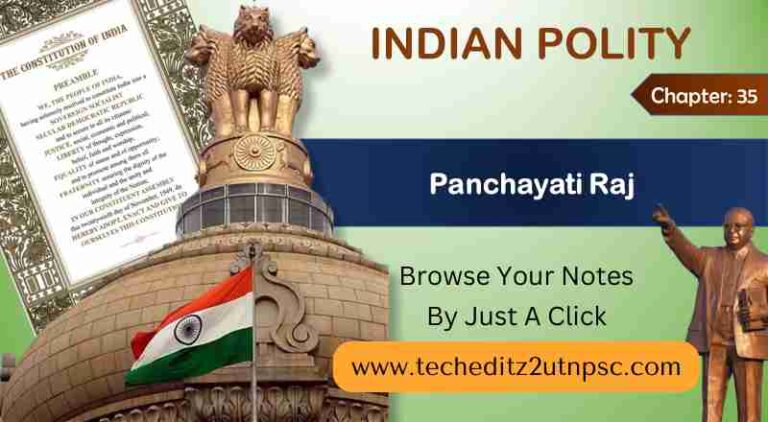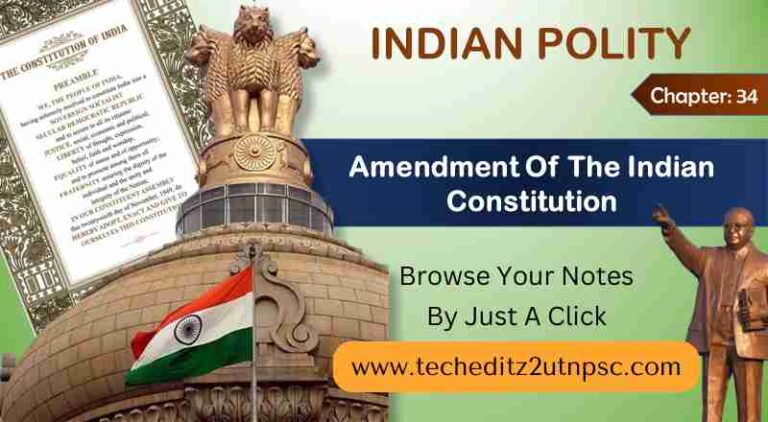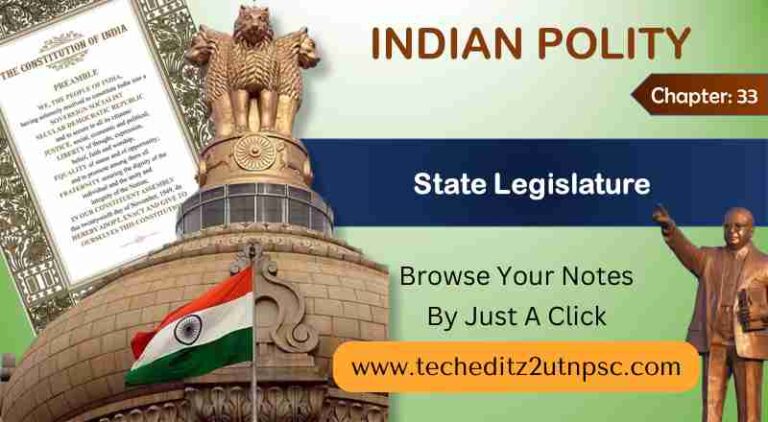support@techeditz2utnpsc.com | 8300-921-521

Citizenship
Indian Polity
Chapter 7: Citizenship
- The Citizenship is mentioned in Part II of the Indian Constitution.
- The Citizenship provisions are covered under articles 5 to 11 of the Indian Constitution.
- The Citizenship provides full political membership in the state, permanent allegiance to the state, Official recognition by the state of his integration into the political system.
- The citizen pledges loyalty to the state
- The state protects the citizens.
- The Citizenship to an individual also brings Rights, Duties, Privileges, Obligations
- The Public (government) offices are open only to the citizens.
- Only the citizens are eligible for the offices of
- The President – (Article 58(1)(a))
- The Vice President – (Article 66(3)(a))
- The Judge of the Supreme Court – (Article 124(3))
- The Judge of a High Court – (Article 217(2))
- The Attorney-General – (Article 76(2))
- The Governor of a State – (Article 157)
- The Advocate-General – (Article 165)
- The right of suffrage (vote) for the election to the House of the people (Lok sabha) and the Legislative assembly of every state – (Article 326)
- Right to become a member of Parliament – Article (84)
- Right to become a member of a state legislature – Article (191(d))
- The citizens are eligible for recruitment to all public services.
- Only the citizens have the right to vote
- The concept of Citizenship came into existence since the adoption of the Constitution on November 26, 1949.
- The Constitution of India laid down the law in regard to who would be the citizens of India at the time of commencement of the Constitution.
- The Constitution of India has not provided for the mode of acquisition and termination of citizenship.
- As per Article 11 of the Indian Constitution the parliament could regulate the right of citizenship by law.
- The Parliament passed the Citizenship Act, 1955 for acquisition and termination of the Citizenship.
Who Are The Citizens Of India?
- As per the Article 11 of the Indian citizenship Act, the Parliament has enacted the Citizenship Act, 1955.
- The Citizenship Act, 1955 has been amended in 1986, 1992, 2003 and 2005.
- The Articles 5 to 8 of the Indian Constitution confers the citizenship on the people at the time of the commencement of the Indian Constitution.
- Persons domiciled in India
- Persons migrated from Pakistan
Persons migrated to Pakistan but later returned to India - Persons of Indian origin residing outside India
- Article 5: This provides that a person becomes entitled to the citizenship of India if,
- at the commencement of the Constitution he has his domicile in the territory of India, Or
- He or either of his parents were born in India Or
- He has been ordinarily resident in the territory of India for not less than 5 years immediately before the commencement of the Constitution.
Domicile:
- The term Domicile is not defined in the Indian Constitution.
- Domicile is a person’s residence where he intends to live on a permanent basis.
- Intention to reside indefinitely Constitutes the Domicile.
- Article 6: This provides for citizenship rights of migrants from Pakistan before the commencement of the Constitution.
- This provides 2 types of distinctions.
- The people migrating to India before July 19, 1948
- The people migrating to India after July 19, 1948
- Note: Permit system for migration was introduced on July 19, 1948.
- A person migrated before July 19, 1948 shall be deemed to be a citizen of India on the commencement of the Constitution if the person or his parents (born in India as defined by the GOI Act, 1935) or
Any of grandparents (born in India as defined by the GOI Act, 1935) And has been ordinarily residing in India since the date of the migration. - In case of migration after July 19, 1948, he should have been registered as a citizen of India by an officer appointed for the purpose by the government of India and has been residing in India for at least 6 months immediately preceding the date of application.
- Article 7: A person who migrated to Pakistan from India after March 1, 1947, but later returned to India for resettlement could become a citizen of India.
- For this the person he had to be the resident of India for 6 months preceding the date of his application for registration.
- Note: the meaning of Migration mentioned in Article 7 is the migration before the commencement of the Constitution.
- The person migrating from Pakistan to India, after January 26, 1950 are governed by the Citizenship Act, 1955.
- Article 8: This Article provides that
- A person Or Any of his parents Or any of his grand parents born in India as defined by the Government of India Act, 1935 but ordinarily residing outside India shall become a citizen of India if registered as a citizen of India by the diplomatic representative of India in that country.
- This is with respect to before or after the commencement of the Constitution of India.
- Article 9: This provides that if a person voluntarily acquired the citizenship of another country, he shall forfeit the right of the citizenship of India.
- The above clause is applicable to cases arising before the commencement of the Indian Constitution.
- Such type of cases arising after the commencement of the Constitution shall be dealt by the Citizenship Act, 1955.
- Note: whether a person has lost the citizenship of India after acquiring the Citizenship of the other country is to be decided by the government of India.
- Article 10: this provides that every person who is or is deemed to be a citizen of India under any of the provisions in the articles 5 to 10 shall continue to be a citizen of India.
- This is subject to the provisions of any law made by the parliament.
- Article 11: This article provides for the Parliament to enact legislations pertaining to the acquisition and termination of the citizenship of India.
- The Parliament passes Citizenship Act, 1955 providing for the acquisition and termination of the citizenship.
- The citizenship can be acquired by 5 ways.
- By Birth
- By Descent
- By Registration
- By Naturalization
- By incorporating a territory
- The citizenship can be terminated in 3 methods.
- Renunciation
- Termination
- Deprivation
Acquiring The Citizenship Of India:
By Birth:
- This was amended in the year 1986.
- A person is the citizen of India by birth if he is born in India on or after January 26, 1950 but before June 30, 1987 or he is born in India on or after July 1, 1987 but at the time of the birth either of his parents was a citizen of India.
- The children of foreign diplomats posted in India and enemy aliens cannot acquire the Indian citizenship by birth.
By Descent:
- A person born outside India was entitled to Indian citizenship if his father was an India citizen.
- This was amended in the year 1992.
- A person born outside India on or after January 26, 1950 is a citizen of India by descent if, at the time of his birth either of his parents was an Indian citizen.
By Registration:
ADVERTISEMENT
- Certain categories of persons can be registered as Indian citizens.
- Persons of Indian origin who are ordinarily resident in India for 5 years immediately before making an application for registration
- Persons of Indian origin who are ordinarily resident in any country or place outside India
- Persons who are married to citizens of India and who are ordinarily resident in India for 5 years immediately before making an application for registration
- Minor children of persons who are citizens of India And
- Persons who are citizens of commonwealth countries
- The period of acquisition of citizenship by registration was increased from 6 months to five years).
By Naturalization:
- A foreigner can acquire the citizenship of India by naturalization if
- He renounces the citizenship of other country
- He is of good character
He has an adequate knowledge of a language mentioned in the 8th schedule of the Indian Constitution - He is not a citizen of a country where Indian citizens cannot become naturalized citizens
- The government can waive all above conditions if a person has rendered distinguished service to the science, art, literature, world peace or human progress.
By Incorporation Of Territory:
- If any foreign territory becomes a part of India, then the government specifies through notification that the people of that territory shall be the citizens of India.
By Renunciation:
- This is a voluntary act by which a person holding the citizenship of India as well as that of another country may give up one of them.
- When a person renounces the citizenship every minor child of his ceases to be an Indian citizen
- But, the child within one year after attaining 18 years of age may resume Indian citizenship.
By Termination:
- When an Indian citizen acquires the citizenship of other country voluntarily, the Indian citizenship is automatically terminated.
By Deprivation:
- This is a compulsory termination of the Indian citizenship by the central government if
- The citizen has obtained the citizenship by fraud Or
- The citizen has shown the disloyalty to the constitution of India Or
- The citizen has unlawfully traded or communicated with the enemy during a war Or
- The citizen has, within 5 years of registration or naturalization been imprisoned in any country for 2 years
- The citizen has been ordinarily resident out of India for 7 years continuously.
- This is not applicable to students and employees who are serving in the international organizations. If a person registers annually at the Indian consulate his intention to retain the Indian citizenship.
Miscellaneous:
ADVERTISEMENT
- The Constitution avoided the dual citizenship.
- There is only once citizenship related to the domicile in the territory of whole India and not in a part of the country.
- In US there is dual citizenship.
- The Citizenship act of 1955 provided for the Commonwealth Citizenships. But this provision was repealed by the Citizenship (Amendment) Act, 2003.
- The PIO (Person of Indian Origin) card entitles a person to visit India without a visa.
Visit Our YouTube Channel For More Free Videos: Click Here


